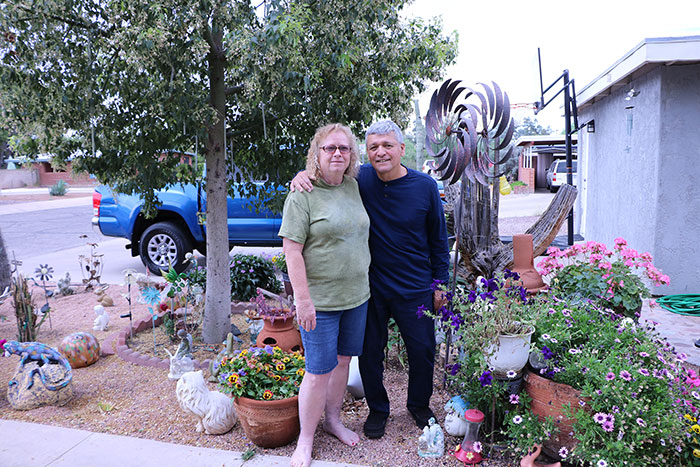Love Shared Fosters a Second Career
In the heart of Tucson live two hearts of gold. Raul and Leigh Medina exude a special love for one another and for family. Raul is a former University of Arizona landscape artist and his wife, Leigh, is a retired educator with 20 years in special education. Together, the couple created a second career that they both share. It’s a 24/7, work-from-home vocation. One that requires commitment and flexibility. Understanding and humor. Caring, sharing and juggling appointments. Raul and Leigh are foster parents to children with developmental disabilities.

Leigh and Raul Medina share their love of family with children whose homelife is in transition. The primary goal of foster care is for the child to return to their own home or find a new “forever” home through adoption.
“Our [biological] kids are grown and gone,” explained Leigh, “and we’re not ready to have an empty house.”
Licensed as a child developmental home with the DES Division of Developmental Disabilities (DDD), the Medinas opened their home and created an extended family for dozens of children over the past seven-plus years. Today, they share their devotion and affection with three children: a girl, age 16; and two boys, ages 15 and 23 months. Each child has their own special needs and each embrace the others as family.
“Our work is here,” said Leigh. “We’re considered ‘career’ foster parents because that’s what we do.”
Building a relationship between temporary parents and a child requires trust. But past abuse, neglect or family instability make it difficult for a child to readily embrace a temporary living arrangement. One method the Medinas employ is to set an example by continuing to live their lives as they have always done.
“We just do what we do [with our biological children],” said Raul. “We just lead our normal lives.”
Leigh confirmed, “They’re just like our own kids. We don’t do anything different with [the foster children]. Our daughter still lives here in Tucson so she comes over a lot. She interacts with them. It’s giving them a normal family.”
How long does it take to build a trusting relationship? “It usually doesn’t take too long,” said Leigh. Their daughter Anna, who has been with the Medinas since December 2018, “acts like she’s been here for a year.”
Raul explained, “By seeing what we do – there [are] no parties or drugs and alcohol – [is] how we gain their love and their trust. We go to church, we do everything that should be done that’s good for the kids. Let them see what a normal life is. If you’ve got loving and caring, everything falls into its place.”
Originally licensed to accept two foster children, the Medinas converted their garage into a fourth bedroom so they could accept a third child. The home’s front yard features a swath of grass on one side of the front walk where the kids can play, the other side is embellished with flowering annuals and perennials that is Raul’s garden. The backyard includes a trampoline and toys. Yet, one of the best features of the Medina home is its location on a cul-de-sac.
“It also helps that we have a really good neighborhood,” noted Raul. “This is like a village. We know everyone on our street [and the neighbors] embrace the kids.” For example, a next-door neighbor is known as ‘Gramma Nancy’ to the Medina’s extended family.
The first foster child the Medinas took in was 13 years old when he arrived. “He actually stayed with us until he aged out at [age] 18,” said Leigh. Afterwards, the young man adopted Medina as his own last name.
“We’re older,” explained Leigh. “We don’t want to adopt. We’re just getting [the children in our care] to a place where they can move on and do good things.”
The couple have “moved on” dozens of kids into forever homes. Also, the Medinas stay in touch with most of their extended family members.
“Most of the kids we’ve had come through, we’re still in their lives in some way or another,” said Leigh. “Were not mom and dad any more. We’re grandma and grandpa!”
“We’re all about family,” stated Raul. “We believe family should come first.”
Developmental Homes are family homes that provide supports to DDD members and are open to no more than three people. DDD contracts with licensing agencies who have a network of subcontracted Developmental Home providers. Services provided at a Developmental Home include teaching, supervision, and room and board. For more information, visit the DDD Developmental Home Licensing web page.
Fostering a child takes commitment, flexibility and unconditional love. Thanks to Arizona’s foster parents, vulnerable children find temporary sanctuary until they are ready to return to their own home. For information on how to become a foster parent, see “Steps for Becoming a Foster Parent.”
By Lyn Riley

